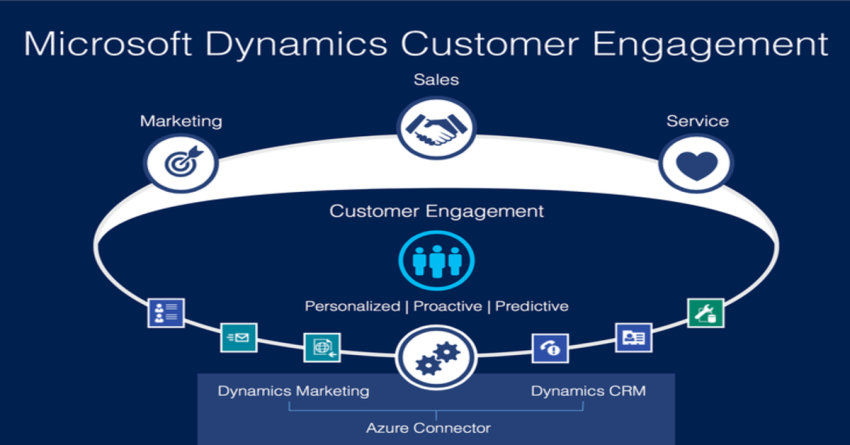In the ever-evolving landscape of customer relationship management (CRM) software, two behemoths stand tall: Microsoft Dynamics CRM and Salesforce.
Both platforms offer powerful tools to streamline business processes, enhance customer interactions, and drive revenue growth.
However, understanding the nuances and differences between the two is crucial for making an informed decision that aligns with your company’s unique needs.
Let’s dive into the features, strengths, and considerations of Dynamics CRM and Salesforce.
Feature Showdown: The Core Offerings
Microsoft Dynamics CRM: A Comprehensive Ecosystem
Dynamics CRM, now a part of Microsoft Dynamics 365, offers a broad spectrum of features designed to empower businesses across sales, marketing, and customer service.
One of its standout attributes is its tight integration with other Microsoft products such as Office 365, Power BI, and Azure.
This integration can provide a seamless experience for users who rely heavily on Microsoft’s suite of tools.
The platform’s user interface is user-friendly, with a focus on ease of use and customization. This can be particularly advantageous for businesses looking to tailor their CRM system to fit specific processes and requirements.
Dynamics CRM excels in managing complex customer relationships, and it’s a strong choice for enterprises with intricate sales cycles and multifaceted customer service needs.
Salesforce: Pioneering Cloud CRM
Salesforce, often considered the pioneer of cloud-based CRM, has a reputation for innovation and scalability. Its cloud-first approach allows for easy access to data from anywhere, making it a favorite for businesses with remote teams or those that prioritize mobility.
The platform is renowned for its robust customization capabilities, thanks to its AppExchange marketplace, which offers a plethora of third-party integrations and add-ons.
Salesforce’s Lightning Experience, a modern and intuitive interface, simplifies user interactions and boosts productivity.
The platform’s App Cloud allows businesses to build custom applications, extending its functionality beyond traditional CRM.
Salesforce shines when it comes to flexibility and scalability, making it an excellent choice for organizations of all sizes.
The Battle of Integration: Microsoft vs. Salesforce
Microsoft Dynamics CRM Integration
One of Dynamics CRM’s key strengths is its integration with Microsoft’s extensive product ecosystem. If your organization heavily relies on Microsoft products, this integration can be a game-changer.
Seamless synchronization with Outlook, Excel, SharePoint, and other tools means that users can work within familiar environments without having to switch between applications constantly.
Additionally, Dynamics 365 integrates seamlessly with other Microsoft cloud services, such as Azure for advanced analytics and Power BI for data visualization.
This tight coupling can lead to increased efficiency and collaboration across teams.
Salesforce Integration
Salesforce’s robust AppExchange marketplace provides a plethora of integration options. The platform is designed to work seamlessly with a wide range of third-party applications, allowing you to tailor your CRM system to your exact needs.
If your business uses diverse tools from various providers, this flexibility is a major advantage.
Salesforce’s open API architecture also means that custom integrations can be developed, providing a high degree of adaptability for unique business requirements.
Whether you’re looking to connect with marketing automation, e-commerce, or analytics platforms, Salesforce’s integration capabilities are a formidable force.
A Matter of Cost: Pricing Comparison
Microsoft Dynamics CRM
Dynamics 365 offers a range of pricing tiers, allowing businesses to select the plan that best aligns with their budget and needs.
The licensing options include Sales, Customer Service, Field Service, and more. The pricing model is typically based on a per-user, per-month basis, with additional costs for premium features and storage.
Salesforce
Salesforce pricing follows a similar per-user, per-month structure, with different editions catering to specific business needs. The editions include Essentials, Professional, Enterprise, and Unlimited.
While Salesforce’s pricing can be higher than some other Dynamics 365 CRM solutions, its extensive features and scalability may justify the cost for businesses that demand a robust and flexible CRM system.
The Verdict: Choosing Your Champion
In the Dynamics CRM vs. Salesforce battle, there’s no one-size-fits-all answer. The right choice depends on your organization’s unique requirements, existing technology stack, and long-term goals.
Choose Microsoft Dynamics CRM If:
- Your organization heavily relies on Microsoft products, and seamless integration with the Microsoft ecosystem is a top priority.
- Customizability and ease of use are essential for your team’s efficiency.
- You have complex customer relationships, and you need a solution that can handle intricate sales cycles and advanced customer service needs.
Choose Salesforce If
- You prioritize a cloud-first approach and require easy access to data from anywhere.
- Flexibility and scalability are critical, and you want a CRM platform that can grow with your business.
- Your organization uses a diverse range of third-party applications, and you need a CRM system that can seamlessly integrate with your existing tools.
Both Dynamics CRM and Salesforce offer powerful features and can significantly impact your business’s success. By understanding your organization’s specific needs and carefully evaluating the strengths of each platform, you’ll be well-equipped to make the right choice.
Whether you’re drawn to Dynamics CRM’s integration with Microsoft’s suite or enticed by Salesforce’s scalability, your CRM decision will play a pivotal role in driving your business forward.


